

Shayne Carter: songwriter, rock star, author, football fan, chess player, average driver. Photo: STEPHEN PERRY FOR METRO/SUPPLIED
Straight from the heart
May 1, 2025
From snotty punk to senior statesman of New Zealand music, Shayne Carter’s career has been wild and acclaimed. But his memoir reveals the drama and trauma going on behind the scenes. Mike White talks with Carter about writing songs, writing his book, and almost writing off his car.
Oh, Shayne Carter. Rock god. Guitar neck thrust into the faces of the front row. Crouching. Grinding. Killing it. All that pouting they always talk about. A big sound in a small room. Sex and sweat and rock’n’roll. His shoes look pretty ordinary, though – like ones you’d get from Hannahs when your kid goes to college.
It’s December, and Carter is in Wellington doing two gigs: half the show is songs from his former band Dimmer, and the other half is from the earlier Straitjacket Fits days. About 25 years covered in those bands, and the two sets reprise much of the gold that came from that time. Carter closes his eyes in the chorus, and devotees repeat the words with him. The sensible ones wear earplugs. The reckless let the chords burn
If anyone is New Zealand’s Mick Jagger, it’s Carter: Jagger without the string of children and tax evasion. Jagger without the pilates and heart surgery. Jagger with less prancing. Jagger with a wanging guitar. Jagger with a whole lot more shit in his past.
We know much about Carter’s upbringing and much of the shittiness it contained, because he details it in his new autobiography, Dead People I Have Known. About the physical violence; about the drinking; about the hidings; his parents splitting and the new father; the depression; loathing school; the sexual abuse on the family’s fringes; the grim contours of life on the slopes of a working-class Dunedin suburb.
Punk rock rescued him. With its message of kicking against the pricks, it gave him a way to kick against his past, and also gave him some kind of direction out of it all.
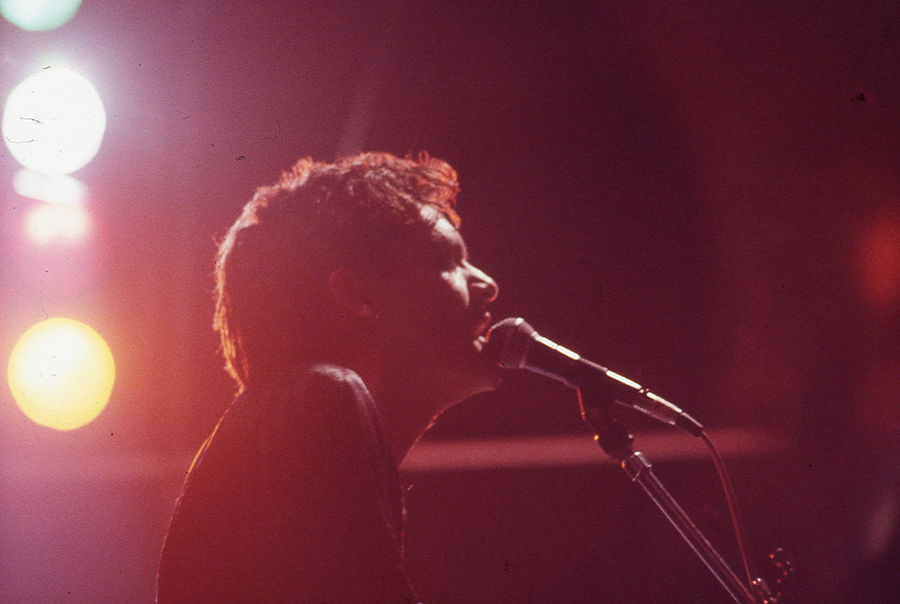
Photo: BRIAN MURPHY
“I was completely ripe for the plucking,” Carter says. “I thought, yeah, this is fucked, and I want to sing about it. I was literally trying to find a way to cope and survive, and defiance was the way to survive. Any art needs something to react against, and I had plenty to react against.”
His parents had played and sung in bands, so in that respect it was only a small step for Carter to get on stage himself. He had the attitude, the looks, the moves. But it was never rock-star charades with Carter, because he could write. It was 1978, it was punk, and being shocking was important, but even then, there were melodies, hooks and smart lyrics.
He had bands: Bored Games (“These kids looked like trouble.” Music historian John Dix); The Doublehappys (“Two frantic guitarists and a retarded drum machine.” Dix); and a couple of collaborations in freezing Dunedin flats. Then the group that launched Carter to a wider world, Straitjacket Fits (“Sounded great, looked great too. Geek to chic ratio spot on.” Music writer Grant Smithies). The greatest guitar band in the world, Melody Maker dubbed them. They got signed to a big label, toured America and Europe, got amazing press, and wrote blistering songs. But then, because this is rock’n’roll, it all went weird and sort of withered.
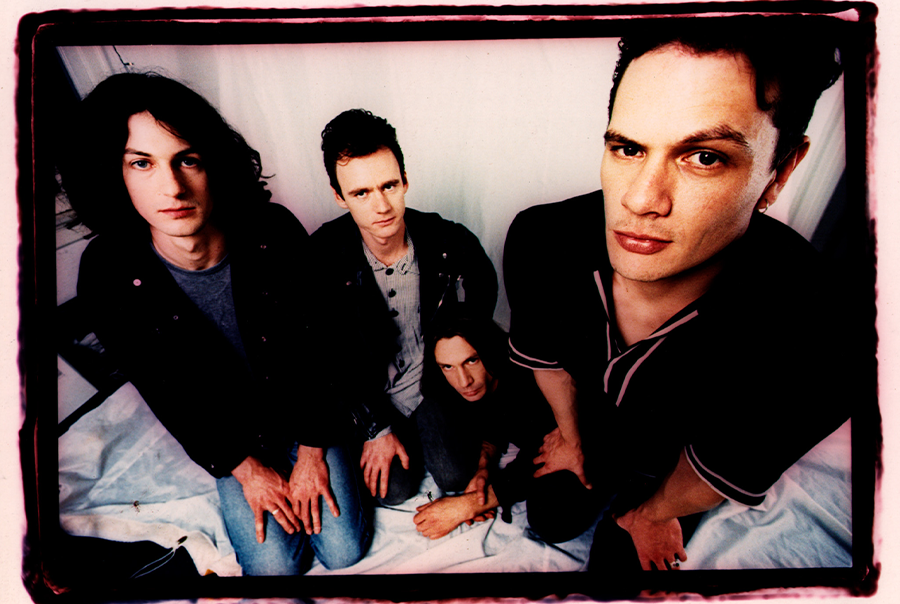
The greatest guitar band in the world, Melody Maker dubbed them. Photo: LISA JOHNSON
Carter, by now in Auckland, went quiet and emerged where nobody really suspected, with the sparse grooves and electronics of Dimmer, which lasted until 2012 – then a piano-based album, Offsider. When his mother died in 2015, he shifted back to Dunedin. The idea of a book had been hovering, like a groupie waiting for the chance to get an autograph. “I always knew I’d write something. I thought, I’ve got a good story to tell. And because all my parents had passed away, I felt I could actually write honestly about my family.”
So for the best part of two years, Carter stabbed away at the story of his life and 40 years of music, with two fingers on a 12 inch MacBook Pro in a crib at Aramoana, three houses down from where gunman David Gray used to live. He’d kept diaries but didn’t draw on them. “They were just so boring. Quite laughably so. Stuff that just seemed so important at the time, but you recognise the absurdity of it later.” So he burnt them.
There were band scrapbooks that helped with chronology and detail, but the book is largely Carter’s memory of it all – the songs; the tours; the shits from record companies; the good people from bands; the string of friends and flatmates who died along the way. Dead People I Have Known.
“I find my book veers between comedy and tragedy, with not much in between, actually,” Carter says. “But that’s alright.”
Much of the drama and tragedy involves Carter. He’s so blunt about his failings and abrasiveness and the offence he’s caused (Neil Finn, Jordan Luck, Dave Dobbyn, Sharon O’Neill, Martin Phillipps, etc), he knows some people might read the book and think, “That Shayne Carter, what an arsehole.”
“Coz I put it all out there, man. But then again, what I thought about that is, I’ve been putting myself out there since I was a kid. To get up and play music is a really vulnerable thing to do.
“So I’ve figuratively been getting up in public with my pants around my ankles since I was 15. And I’m not scared of that. And it’s liberating not to be scared of the truth; I don’t have to build a facade.
“So if people want to take that out of the book, I honestly don’t give a shit. I’ve had people dissing me as soon as I hit the mic. I’ve long learnt that other people’s opinions don’t mean shit, and if you listen to them, you get nothing done. Everyone’s got shortcomings. And if there’s any theme in the book, it’s that we all struggle with our crosses. And sometimes we just try to cope and sometimes we fail even at coping – no shame in that. Everyone’s just trying to get along. Life is really tough and life is cruel and some people have to carry a lot of shit in their lives.”
There’s been ample of that in Carter’s life, but he’s adamant he didn’t want the book to be a whine, a self-centred sob. “The last thing I wanted to do was be a moaner: ‘Oh, the record industry was so cruel to me, it was so unfair, and if only…’ I just wrote about it honestly. I’ve met cool people in the record industry. But, as a beast, it’s mainly quite repulsive, because it’s just this capitalistic exercise that picks up people and squeezes them out like facecloths and throws them away. But that’s showbiz, man, and your use-by date comes up pretty quickly.”
Nor, Carter says, was the book a vehicle for vengeance, and he trod carefully when describing people he’d come across, not wanting to trample the dignity of those who’d died and couldn’t speak for themselves.
“But then again, I did shove it to a few people that deserved it, so there you go.”
Music critic Nick Bollinger says there are plenty of memoirs from international musicians, but in New Zealand the genre fills a pretty small bookshelf:
Ray Columbus did one; Dave McArtney’s came out posthumously; Sneaky Feelings’ Matthew Bannister ruffled feathers and egos with his reflection on Dunedin music.
“The rock and roll story has been told so many times,” says Bollinger, “but Shayne’s one is actually unique, and I think it’s because it’s a part-Māori boy from Dunedin, and his early childhood stuff – which is vivid and brilliant – explains why he’s so 100 percent with his music, because it’s like he realised at some point that was the only way he could survive. Otherwise, he was a very marginalised kid.
“To me, Shayne Carter really stands head and shoulders above pretty much above the whole Dunedin scene. I mean, there were some other brilliant musicians, don’t get me wrong. But that was an era when shoe-gazing was at its peak – they wore black jerseys, stared at their shoes, and strummed their meaningful, heartfelt songs. But Shayne was different. Shayne was a rock star, and he knew it. He was actually aware of his charisma and what it meant to be a performer.”
What also sets Carter apart, Bollinger says, is his constant willingness to extend himself and explore different musical veins. “He wasn’t going to do endless re-runs of ‘She Speeds’. He moved beyond that guitar-band thing before other people were sick of it.
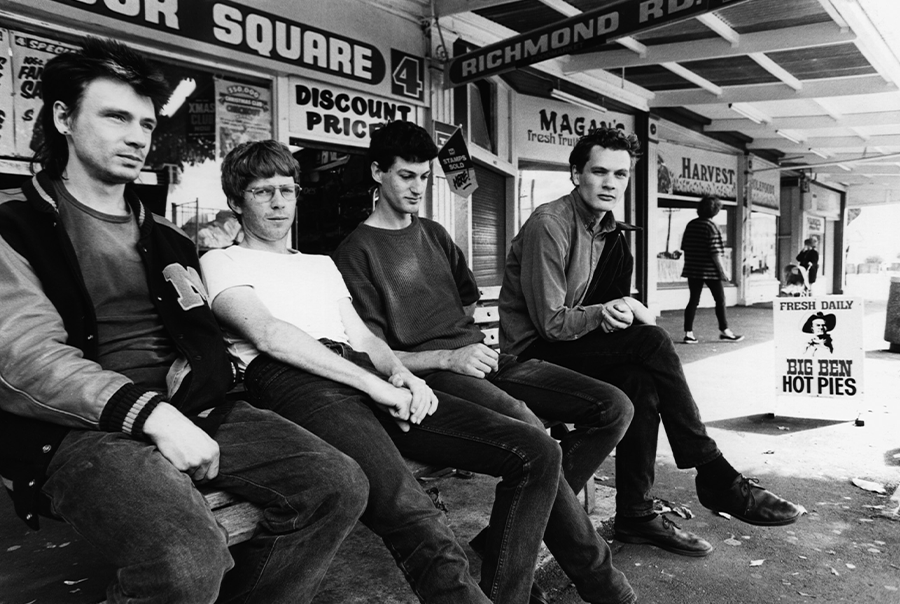
Straitjacket Fits in Auckland’s Grey Lynn shops, 1991. From left, Dave Wood, Andrew Brough, John Collie and Shayne Carter. Photo: CHRIS KNOX
“I think an audience would have been quite happy for him to do the Straitjacket Fits forever, but he then demolished that and started Dimmer, and started experimenting with very different ways of putting music together.
“It’s the punk ethos to not sell out and I think it’s always been important to him not to have been seen to sell out. He’s much more interested in following his genuine love of music, his genuine curiosity about where it can lead you and what can come out of it.”
Graeme Downes flatted with Carter, taught him his first guitar chords, played football with him, and Downes’ band, the Verlaines, was part of the cluster of groups that flourished in early-80s Dunedin when Carter was emerging.
Now a senior lecturer at Otago University’s music department, Downes says Carter is “a bit of a legend. It was a remarkable generation and Shayne was a pretty amazing individual in the middle of it.”
Competition between the groups drove them to play better and write even better songs – and then wipe the floor with other bands at that weekend’s gigs. The songs Carter wrote will survive, Downes says, because of his innate songcraft and because he never attempted cookie- cutter pop. “The choices he makes with every note are pretty darned clever.”
Carter, 54, says he never fell for the fortune and fame game, even when Straitjacket Fits were touring the States and he was touted as anything from the next Bono to a refreshed Bruce Springsteen.
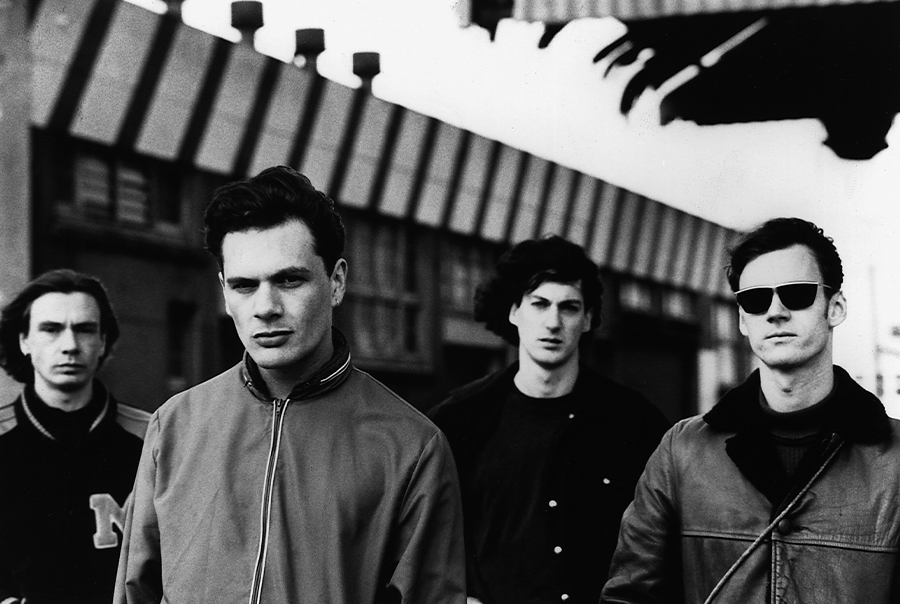
Straitjacket Fits. Photo: DARRYL WARD.
“To actually really be huge, you do have to buy into it to a certain extent – you can’t have any doubts about it. And when I was younger, I was surrounded by that kind of stuff: ‘Oh, if you just do this and just do that, you’ll be successful.’ But I’m not an idiot and my bullshit detector has always been strong.”
However, Carter admits he did once try to purposely write a hit song. “I thought, I like pop songs, I could write a hit. But I can’t. It was a really shit song.” It made it onto a Straitjacket Fits album though, and it’s a lingering humiliation for Carter.
“I’d never name that song. Never. I’m never going to fess up to where that is.” He’ll never play it live, either.
It was a lesson on the evils of contrivance, and another sign he wasn’t made for mainstream moulding. “I’ve never made much money, but to me, that’s been part of the trade-off. I’ve never been a global superstar, but I’ve also experienced what fame is all about. And it just means people look at you in the supermarket when you’re buying toilet paper. That’s pretty much it, man.”
There’s that Great Unwashed song, ‘What You Should Be Now’, by David Kilgour, who Carter kicked around with when starting out in bands. And it’s got that line ‘Saw you back in Dunedin, things are strange, yeah?’
Things could have been a bit weird for Carter when he returned to his home city after more than 25 years away. But it’s been good, people there have been kind. The worst things have been losing his football-playing buddies from Auckland, and driving his car into a ditch the other week. (Carter only learnt to drive a few years ago and there have been a string of mishaps.)
“The community down here respects me and they kind of look out for me in a lot of ways.”
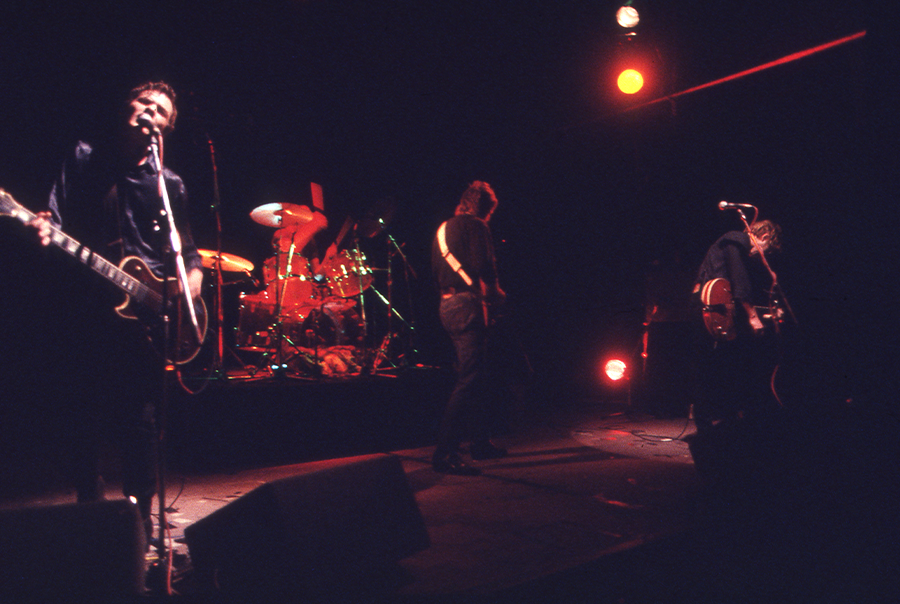
Straitjacket Fits live. Photo: BRIAN MURPHY
As well as his own projects, Carter mentors promising musicians, including kids at his old school, Kaikorai Valley High, where Carter’s principal twice walked out on his band during talent quests in the 70s. That bit is strange, Carter says. “You always feel like a fraud as soon as you walk into the staffroom and feel like you’re 13 again and shouldn’t really be here.”
But he loves it, impresses on the kids how valuable and valid music is, encourages them to hold on to their quirks and weirdness and put it into their music so they don’t sound like everyone else. Carter taught himself guitar, can’t play a scale, but tells the kids everything he knows about the music game.
“You’re a twig in the river and music, like many kinds of wisdom and knowledge, you just pass on to the next generation and they do their own thing with it. And it’s not something I’m going to jealously guard in the bank and say, ‘Oh no, you can’t look at that, because then you’ll steal my tricks.’ It’s, ‘Here’s my tricks, do with them what you shall.’”
Of course, people still come up to him and tell him they love his songs and that he’s great. That’s nice, but he isn’t hooked on flattery and doesn’t rely on approbation. “And I don’t think that. I think I’m a guy that drives into ditches.”
Coming home has also meant experiencing Dunedin’s natural environment again, and the “beautiful and bleak melodies” of places like the Otago Peninsula. You’re hemmed in by hills, he says, with an “action-packed pocket of sky where all this turbulent shit is happening at quite a low level. Auckland is this big wide-screen thing.
“You can’t stand in these surroundings and not have them affect you and impact on your psyche. It totally seeps in.”
Carter recently returned from a three-month artist’s residence in Thailand, where he was exposed to completely different music styles and artists. He’s been doing live music with Atamira Dance Company, and also with Michael Hurst in the stage production An Iliad (performed in Dunedin last year, the show is in Auckland for a season at the Herald Theatre.
He’s enjoyed the diversity and wonders whether he’ll ever do another record. But he’s been saying that for decades, and then the next one creeps up on him, ready to be fleshed out.
He’d like to write more, maybe a comic fable, maybe do some comedy, as he’s always loved its absurdity and attendant sadness. But music will always be there.
“Good music, its basic essence, is that it makes people feel better. And the squares don’t get that, because you can’t put a monetary value on it. It’s the recognition of common feelings, the mutual celebration of something everyone loves, and the possibility of human potential when you see someone performing great.
“I just want to do good work, man. I’ve said to so many musician friends, you’re not going to be reading your bank statement on your death bed, and that’s so true. Whereas, if you’ve done good work, that lives on. I love the fact that I can be touched by something somebody created 200 years ago. I can actually hear their soul – it makes me feel less lonely.”
And deep down, beyond any private anxieties or lingering scars from life in the music industry, Carter knows his work will outlive him. Milestones so solid they will plot his path. Touchstones so universal they’ll resonate beyond his generation.
“And that’s awesome, man,” says Carter. “That is my reward.”
